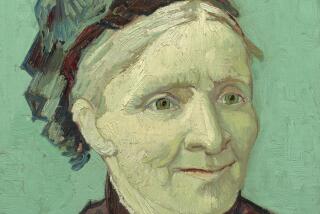Art Alfresco : Indian in the Stone
- Share via
Something of this magnitude usually begins with a plan, but Francis Jansen’s 13-foot, 7,500 -pound statue, “Transformation Through Forgiveness”--commonly referred to as “Eagle Man”--began with a vision. Traveling through Italy seven years ago, Jansen visited Pietra Santa, a village famous for its marble and as a work site for Michelangelo. While visiting rock yard, she says, “for about 15 seconds, a marble block literally opened up an I saw a Native American man lying face down on the ground yearning to be lifted form that stone.” After her shivering subsided, she says, she was in a daze for days, wondering “What on earth was that?”
Dipping into her savings, Jansen had the 5-ton rock shipped to her Ventura work yard, where it lay for a year. Jansen had no formal art training, teaching herself to sculpt by making a few small pieces. When she finally began to work on the marble in January 1991, she had no image in her mind. “I’d just speak to the rock constantly, saying ‘Who are you? Who are you? Tell me who you are.”’ When she was through, she had carved a monumental figure with thundering muscles and a serene face, cloaked in the body of an eagle.
She first displayed the sculpture at the Santa Barbara Mission, paying $12,000 of her own money to have it moved and insured. It stood at the mission for two years and now resides at La Casa de Maria, an ecumenical retreat and conference center in Montecito, where visitors regularly leave feathers, notes, bells and poems at its feet. Jansen has donated the statue to the three Survivors of Wounded Knee associations and hopes that it will one day be moved to the site of the massacre.
Her original plan was to display the statue at other sites, like the mission, that played key roles in Native American history. But her stewardship of the statue has left her financially strapped. “I’ve lived in a palace,” she says. “I can live in a trailer.” Recently, a visitor left a short poem at the statue’s feet that alludes to lines by the German poet Rainer Maria Rilke: “and those of us who believe that forgiveness only rises/will be overwhelmed/whenever a forgiving thing falls.”
More to Read
Sign up for The Wild
We’ll help you find the best places to hike, bike and run, as well as the perfect silent spots for meditation and yoga.
You may occasionally receive promotional content from the Los Angeles Times.






